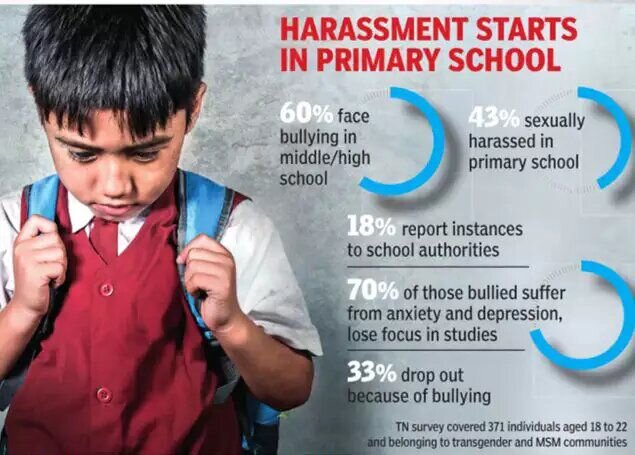Social Justice
Sexual Orientation and Gender Identity: UNESCO
- 10 Jun 2019
- 2 min read
Across India, students are bullied because of their sexual orientation and gender identity (SOGI), forcing many to drop out from schools.
- UNESCO’s New Delhi office has teamed up with Sahodaran, a male sexual health initiative in Chennai, to conduct a community-based study on SOGI-based bullying in Tamilnadu.
Findings
- 60% and 50% were found to be a victim of physical bullying when they were in middle/high school and higher secondary school respectively.
- 40% were sexually harassed when they were in primary school.
- 18% of participants reported incidents of SOGI-based bullying to school authorities.
- 53% of those who reported being bullied said that authorities took some action against the person who bullied them.
Consequences of SOGI based violence
- 73% had reduced social interactions with their peers.
- 70% suffered from anxiety and depression.
- 63% reported lower academic performance.
- 53% reported skipped classes.
- About a third (33.2%) said bullying played a key role in discontinuing school i.e increase in the school dropout rate.
Initiatives for reducing SOGI based violence:
- UGC (University Grant Commission) recognized gender identity and sexual orientation as grounds for ragging in 2016.
- Bilingual manual, ‘A Teacher’s Guide To Gender Non-conforming Students’, (that gives some insight about what is sexual orientation, gender identity, why some children are different from others, how to identify a gender non conforming child) was distributed free of cost in Tamilnadu schools.
- NGO SAATHII has been studying violence against SOGI in partnership with LGBT community groups such as AMANA and ETA in Manipur, VIKALP in Gujarat, Queerala in Kerala and Nirangal in Tamilnadu.
- In section 377 judgment, the supreme court had made it clear that Article 14 of the Constitution guarantees equality before the law and this applies to all classes of citizens thereby restoring ‘inclusiveness’ of LGBTQ Community.





-min.jpg)